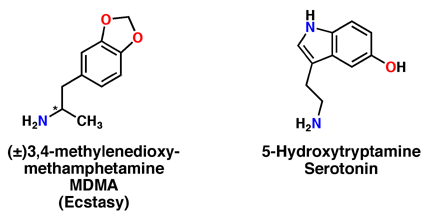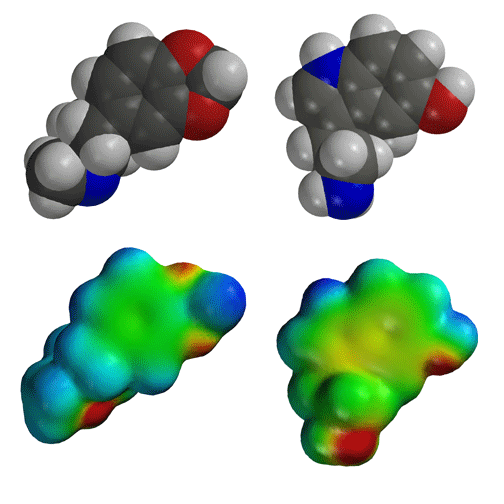


Serotonin, also known as 5-HT (5-hydroxytryptamine), is a neurotransmitter found at the synapses of certain neurons. That is, it is released by the tip of one stimulated neuron, and recognized by a specific serotonin neurotransmitter receptor on an adjacent neuron, causing it to fire. In this way, the nerve impulse is propagated throughout the nervous system. Note that after a nerve fires at a synapse, the neurotransmitter must be taken back up by the original neuron and transported back into a synaptic vesicle so that it is ready to fire again. This so-called “re-uptake” is an extremely important aspect of nervous system function.
Neorons that release different neurotransmitters are found in different
parts of the nervous system. Serotonin is found in parts of the brain
associated with memory, emotions, and feelings. It is also important for
body temperature regulation among other things.
MDMA or ecstasy causes the rapid release of serotonin from neurons, in
essence causing many to fire at once. This can cause an intense feeling
of well-being and is found to be pleasurable by some. Recent research
reveals that the serotonin is released because the MDMA interacts with
the proteins responsible for transporting serotonin around the neuron
as it gets ready to fire.
Every generation for the past several, young people have believed they
have found the first truly safe recreational drug. First it was LSD in
the 60’s, then it was cocaine in my era. Both have been shown to
be harmful in numerous ways. Recently, ecstasy has been touted as being
safe and all-night rave parties are still around. This is truly scary
as ecstasy has recently been found to be extremely dangerous, causing
what appears to be permanent brain damage with even a single use. No,
this is not overstated propaganda to stop use of a drug. It is a scientific
warning that ecstasy users are harming themselves, perhaps permanently.
Through mechanisms that are only now being understood, it turns out that
the serotonin containing neurons
die in response to exposure to ecstasy!!! They
undergo programmed cell death, apoptosis. The first result of this
is that users have to take more ecstasy to get the same effect, causing
even more damage with subsequent use. Clinical studies have also established
that this is associated with loss
of memory function. It is a very long lasting effect, and
it is feared to be permanent. One last problem. A significant number
of animals in studies die from hyperthermia when given even one dose of
ecstasy. That is, they lose control of their body temerature and they
die. This happens in too many people as well, creating the real threat
of fatal overdose. Bottom line: ecstasy is extremely damaging and should
never be used!!!!
